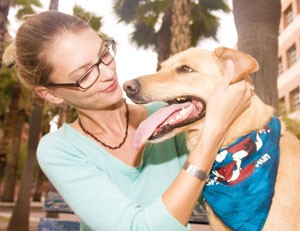After almost two years of pressure from local citizens, university officials, animal welfare organizations and some student involvement, the UA is putting together the final steps to start a student-run group bent on combating pet abandonment.
It has long been documented that at the start of the hot summer months, there seem to be more cats and dogs roaming Tucson’s streets.
The Southern Arizona Humane Society typically picks up almost 300 more animals in the months leading up to July than it does in December and January.
Some animal welfare organizations like FAIR (Foundation for Animals in Risk) and shelters like the humane society agree that one source of an increase of stray animals is due to the fact that students leave for vacation during these months. Many of those pets end up staying behind permanently.
Mike Tully, an advocate for animal rights since 2006, said he is aware that adults “”do it too,”” but knowing these facts, he cannot help but try to work fighting for a solution to what might just be a small part of the problem.
Tully and Ana Luisa Terrazas, the director of communications at the College of Education, have been working to get university officials involved for some time, and until very recently, were unable to garner enough support to brainstorm their next steps.
“”It took a while for them to respond, but once they did, things picked up pretty quickly, and it’s in their ballpark at this point,”” Tully said. “”My part is to inform and get people to try and recognize the problem, and then get the students to do the heavy lifting.””
Terrazas said she has been closely working alongside Tully, trying to speak with those involved in student affairs to bring a face to what has been an “”informal network”” they started when the duo first decided to educate students about properly caring for animals.
“”I think what’s really great is that when so many students get involved, it will sort of take off like wildfire,”” Terrazas said. “”So many people are shocked it’s an issue on campus, yet still there are so many people doing it, and maybe they are embarrassed to come out and say it.””
In a meeting last week, organizers from FAIR – Tully, a student volunteer at the UA and Anthony Skevakis, a program coordinator for the Dean of Students Office – exchanged ideas to get the ball rolling for involving students in a process that Tully has repeatedly said “”needs a student solution.””
“”Right now, I’m spearheading all the efforts to get this organized, but what I see probably happening is once the students pick this up, this is going to become their baby,”” Skevakis said. “”Then rather than me run their organization for this element, I’ll work with them through transition to hold them accountable and to make sure they have that focus.””
The mission has now found a place with UA administration, and its goal is focused on getting students on campus to form a group conducive to educating students about the maintenance of pets, and how they can use community resources to get their animals spayed or neutered.
Crystal Bartels, a UA graduate student, said she started volunteering at FAIR in April to help families apply to adopt homeless animals.
After seeing an article about Tully and his effort to start organizing student involvement, she became interested in what she could do as a volunteer at FAIR and as a UA student who was heavily interested in rescuing animals.
“”We really, really would like to see college students have the interest to educate others about pet abandonment and at the end of every semester, get a little organization going,”” Bartels said. “”So many people in the community see the problem, and we want to show them that the UA is not just going to sit back and not do anything about it.””
As of now, the UA has no formal group dedicated to animal welfare or education for students to help them take care of an animal once they have decided to own a pet.
Skevakis said he has received good feedback from outside sources, including an offer from a business to provide free printing for flyers to get the community involved.
Once a minor student organization coalesces to promote and recruit members, an honorary might also become involved, providing the cause with a definite face that will further extenuate the issue.
Helen Taribuono, a representative from FAIR, said she thinks student fostering of animals might be a facet of the upcoming student organization, and once it is formed, people who ultimately cannot make a lifetime commitment to their pet, can still get their “”fuzzies.””
“”Ideally students would be good for fostering if they were responsible. That way, by the end of the semester, they can come back and get another animal,”” Tardibuono said. “”But the key word is they have to be responsible.””
Bartels said she is working alongside others to get unaware students on campus involved and is hoping to see major improvements by the upcoming semester.
Setting up booths at orientation and bringing in FAIR employees to speak with students are just some of the ideas the group will be brainstorming about implementing in the next few weeks.
“” “”I think sometimes it’s maybe out of students’ consciousness; when you spend more time around campus and see feral cat colonies outside, you may be able to see it more – more than when you’re going to school and trying to get to class and at the same time have some semblance of a social life,”” Bartels said. “”But we’re working on this and having a sense of more global community. It may take a while to persuade people, but once people grab on, the community will see the support and they will grab a hold of it too.””









